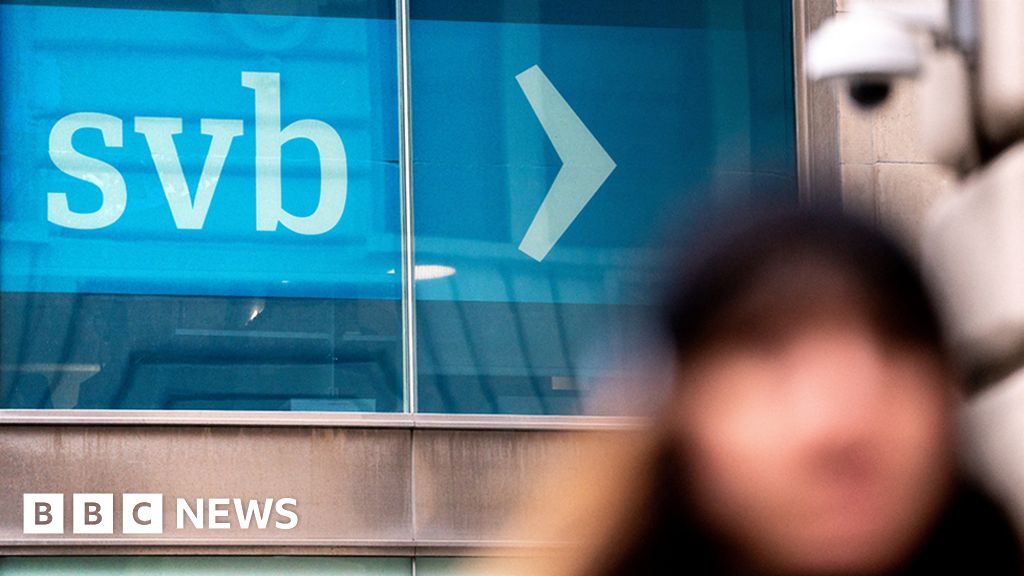
- Written by Natalie Sherman, Darbel Jordan, and Farea Masoud
- BBC Business Correspondents
Is this the beginning of a financial crisis?
Ratings giant Moody’s warned of more pain awaiting the US banking system after a run on deposits led to the collapse of Silicon Valley Bank.
Moody’s downgraded its outlook for the sector to “negative” from stable, warning of a “rapid deterioration in the operating environment”.
The downgrade came as banking stocks in the United States and Europe rebounded after earlier losses.
But Moody’s said some other banks faced withdrawal risks.
She said rising interest rates also pose a challenge, exposing banks that bought assets such as government bonds when interest rates were low, to potential losses.
“Banks with large unrealized losses in securities and uninsured US non-individual depositors may remain more sensitive to depositor competition or eventual flight,” Moody’s said in the report.
“We expect pressures to continue and to be exacerbated by continued tightening of monetary policy, with interest rates likely to remain elevated for longer until inflation returns to the Fed’s target range.”
Authorities acted quickly to try to contain the fallout after the sudden collapse of Silicon Valley Bank (SVB), the 16th largest bank in the US.
The company, a major lender to technology companies, failed last week after a rush of customer withdrawals, sparked by the bank’s disclosure that it needed to raise cash and had to sell a raft of assets, mostly government bonds, at a loss.
US regulators took over the bank and said they would guarantee deposits above the $250,000 level usually insured by the government. They’ve taken similar steps in their smaller signature bank.
US media reported that officials from the Justice Department and the Securities and Exchange Commission are now investigating the crash.
Reports have indicated that some clients of smaller US banks are trying to funnel their money into larger institutions.
Analysts expect turmoil in the financial system caused by failures to lead the Federal Reserve to slow or stop raising interest rates when it meets next week.
That view gained traction on Tuesday after the latest inflation report showed prices in the United States rose 6% in the 12 months through February, in line with expectations, helping to boost stocks.
As trading started on Tuesday, San Francisco-based First Republic Bank — which saw its share price drop 62% on Monday — jumped more than 50%, one of a number of companies whose shares were seeing a recovery. It eventually closed up nearly 30%.
The three major stock indices were also higher, with the Dow Jones up 1%, the S&P up 1.7%, and the Nasdaq ending the day over 2% higher.
In the UK, banking stocks – which had fallen sharply on Monday – were up by Tuesday noon. The FTSE 100 is up about 1.2%.
The European Stoxx Banking Index also opened lower on Tuesday but then recovered to finish up nearly 3%.
But shares in HSBC, which bailed out SVB’s UK business for £1, closed 1% lower, and there were huge losses overnight in Japan, where major lenders such as the country’s largest bank MUFG saw their share prices drop by more than 8%.
The Japanese bank stock index, known as the Topix Banks Index, fell 7.4%, despite the Bank of Japan’s (BoJ) reassurances.
“The direct exposure of Japanese financial institutions to Silicon Valley banks is small, so the impact is likely to be limited,” said a Bank of Japan official.




More Stories
JPMorgan expects the Fed to cut its benchmark interest rate by 100 basis points this year
Shares of AI chip giant Nvidia fall despite record $30 billion in sales
Nasdaq falls as investors await Nvidia earnings